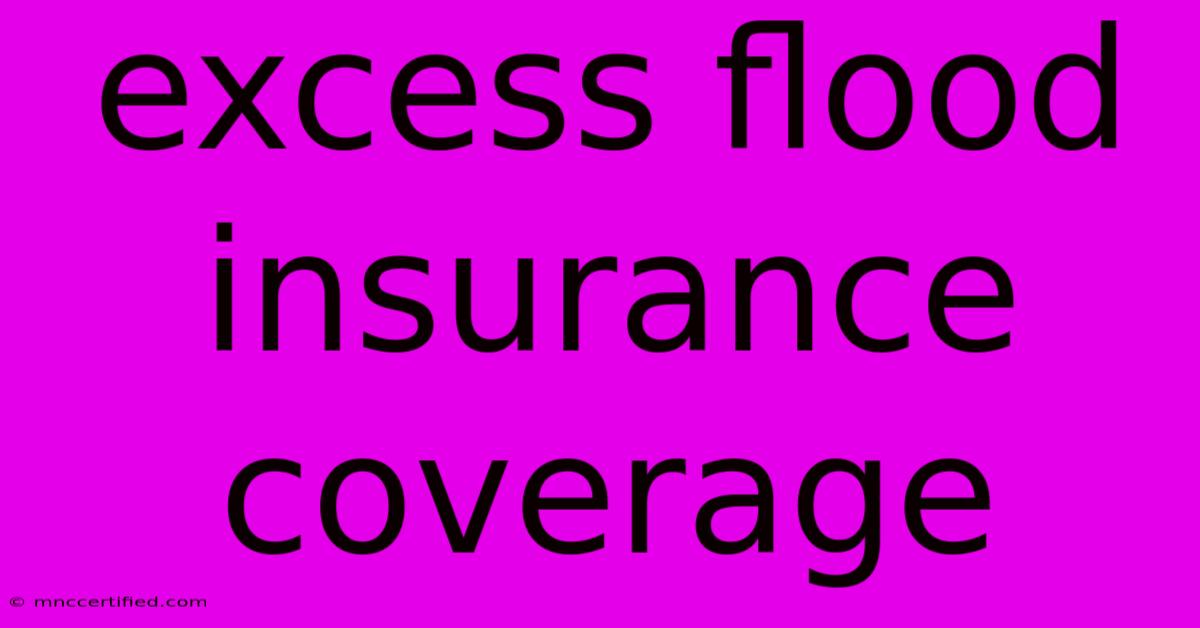Excess Flood Insurance Coverage

Table of Contents
Excess Flood Insurance Coverage: Is It Right for You?
Are you adequately protected against flood damage? Standard flood insurance policies, while crucial, might not cover the full extent of potential losses for high-value properties or businesses facing significant flood risk. This is where excess flood insurance comes into play. This article will explore what excess flood insurance is, when you might need it, and how to determine if it's the right choice for your specific circumstances.
Understanding Excess Flood Insurance
Excess flood insurance, also known as umbrella flood insurance or layered flood insurance, acts as a supplemental layer of protection on top of your primary flood insurance policy. It kicks in after your primary policy's coverage limit is exhausted. Think of it as an additional safety net for catastrophic flood events. While standard policies, typically offered through the National Flood Insurance Program (NFIP) or private insurers, provide a certain level of coverage, they may not be sufficient for high-value homes, businesses with extensive inventory, or those in high-risk flood zones.
Key Differences from Primary Flood Insurance
- Coverage Trigger: Primary flood insurance begins paying out once the flood event occurs and damages exceed your deductible. Excess flood insurance only activates after your primary policy's coverage is completely used up.
- Coverage Limits: Excess flood insurance policies offer higher coverage limits than standard policies, allowing for the recovery of significantly greater losses.
- Cost: Expect higher premiums for excess flood insurance due to the increased risk and coverage amount.
- Policy Types: Excess flood insurance can be purchased from private insurers specializing in high-value properties or complex risk assessments. It's less common to find excess flood options directly through the NFIP.
When Do You Need Excess Flood Insurance?
Several scenarios highlight the need for excess flood insurance:
- High-Value Properties: Homes with significant market value or those containing expensive personal belongings might require excess coverage to fully replace or repair damage from a major flood.
- Businesses with Extensive Inventory: Businesses, particularly those storing valuable equipment, inventory, or supplies, need adequate protection to prevent financial ruin after a flooding event. The potential loss of inventory often surpasses standard policy limits.
- High-Risk Flood Zones: Properties situated in high-risk flood zones, designated as special flood hazard areas (SFHAs), face a statistically higher chance of flooding. Excess coverage offers a crucial safety net in these high-risk locations.
- Coastal Properties: Coastal areas are particularly susceptible to storm surge and flooding, necessitating comprehensive coverage to mitigate the significant damage that often occurs in these regions.
- Businesses with specialized equipment: Businesses relying on specialized or expensive equipment that might not be fully covered by standard policies need to consider excess flood insurance. The cost to replace this equipment may significantly exceed primary policy limits.
How to Determine Your Need for Excess Flood Insurance
- Assess Your Assets: Calculate the replacement cost of your home, belongings, and business inventory. Consider potential business interruption costs as well.
- Review Your Current Flood Insurance Policy: Understand the coverage limits of your primary flood insurance policy.
- Evaluate Your Flood Risk: Determine your property's flood risk using resources like FEMA flood maps.
- Consult with an Insurance Professional: Discuss your risk assessment and financial circumstances with an insurance broker experienced in flood insurance. They can help you determine the appropriate level of excess coverage.
- Compare Quotes: Obtain quotes from multiple insurers to find the best rates and coverage options for your specific needs.
The Bottom Line: Protecting Your Investment
Excess flood insurance isn't a luxury; it's a strategic investment for protecting your most valuable assets. While the cost might seem significant, the potential financial devastation from a major flood far outweighs the premium. By carefully evaluating your risk and consulting with a qualified insurance professional, you can determine the right level of excess flood insurance to safeguard your future. Don't underestimate the power of a flood; proactive planning and comprehensive coverage are your best defenses.

Thank you for visiting our website wich cover about Excess Flood Insurance Coverage. We hope the information provided has been useful to you. Feel free to contact us if you have any questions or need further assistance. See you next time and dont miss to bookmark.
Featured Posts
-
Kane Hat Trick Fuels Bayern Victory
Nov 23, 2024
-
Return To Paradise Characters In Death In Paradise
Nov 23, 2024
-
How Will Election Affect Crypto
Nov 23, 2024
-
Nuno Mendes Injury Update Coach Speaks
Nov 23, 2024
-
Chelseas James Faces Injury Wait
Nov 23, 2024